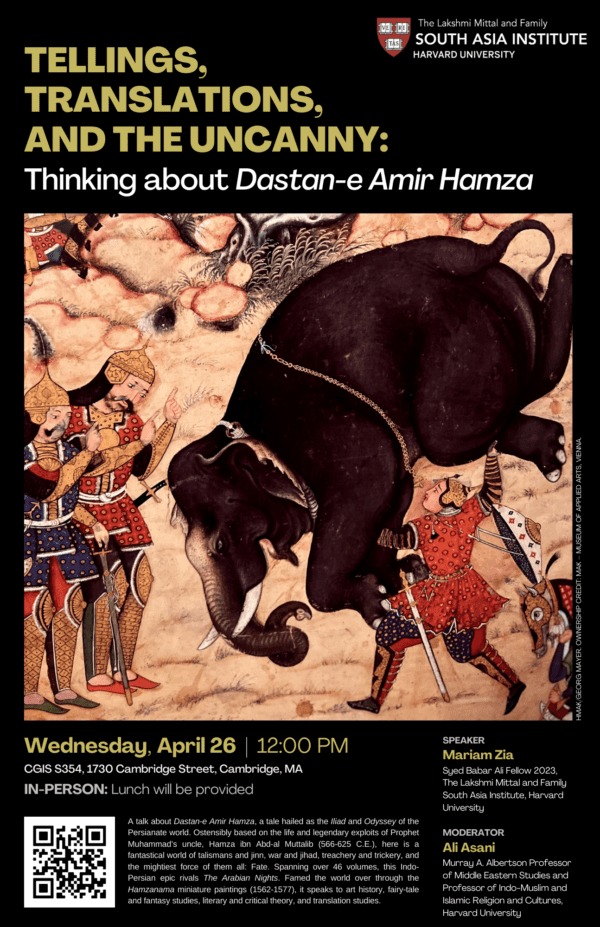A talk about Dastan-e Amir Hamza, a tale hailed as the Iliad and Odyssey of the Persianate world. Ostensibly based on the life and legendary exploits of Prophet Muhammad’s uncle, Hamza ibn Abd-al Muttalib (566-625 C.E.), here is a fantastical world of talismans and jinn, war and jihad, treachery and trickery, and the mightiest force of them all: Fate. Spanning over 46-volumes, this Indo-Persian epic rivals The Arabian Nights. Famed the world over through the Hamzanama miniature paintings (1562-1577), it speaks to art history, fairy-tale and fantasy studies, literary and critical theory, and translation studies.
Read an introduction here.
Speaker: Mariam Zia, Syed Babar Ali Fellow, Mittal Institute
Dr. Mariam Zia is Assistant Professor and Coordinator, Department of Social Sciences, Lahore School of Economics, Pakistan, and the Syed Babar Ali Fellow for Spring 2023 at the Mittal Institute, Harvard University. Her PhD (University of Sussex, UK, 2017) was the first book-length study of the English translation of the Indo-Persian classic, the one-volume Dastan-e Amir Hamza. Her thesis translates material from various Urdu resources to lend theoretical grounding to the study of an indigenous genre that has only been conceived through Anglophone approximations in academic settings outside South Asia. During her fellowship at the Mittal Institute, Dr. Zia will be working on her translation of the first volume of Shamsur Rahman Faruqi’s multivolume study of the 46-volume Dastan-e Amir Hamza titled Sahiri, Shahi, Sahibqirani: Dastan-e Amir Hamza ka Mutalea(Sorcery, Magic, Kingship: A Study of The Adventures of Amir Hamza).
Her research interests include theory and culture, the ‘uncanny’, storytelling, and translation. Her work has appeared in the Oxford Literary Review, South Asian Review, and the Journal for the Fantastic in the Arts. Intermittently, Dr. Zia also writes for newspapers in Pakistan. She has also been involved in the Columbia University project “Teaching World Epics” spearheaded by Professor Jo Ann Cavallo. Dr. Zia is currently working on her monograph titled “Religious Orientations, Storytelling, and the Uncanny: A Reading of The Adventures of Amir Hamza.”
Moderator: Ali Asani, Professor of Middle Eastern Studies and Professor of Indo-Muslim and Islamic Religion and Cultures
Professor Asani has been particularly active post-Sept 11 in improving the understanding of Islam and its role in Muslim societies by conducting workshops for high school and college educators as well as making presentations at various public forums. He is particularly interested in the arts, broadly defined, as the primary means by which Muslims have experienced their faith and their potential as pedagogic bridges to foster a better understandings of the Islamic tradition. He has been involved in the Islamic Cultural Studies Initiative, an international professional development program for high school teachers in Kenya, Pakistan and Texas intended to promote a culturally and historically based approach to the study of Islam and Muslim societies. He has also served on the American Academy of Religion’s Task Force on the teaching of religion in schools and as a consultant for the National Endowment for the Humanities Bridging Cultures Muslim Journeys Bookshelf Project. Professor Asani is recipient of the Harvard Foundation medal for his outstanding contributions to improving intercultural and race relations at Harvard and the nation. More recently he was awarded the Petra C. Shattuck prize for excellence in teaching by Harvard’s Division of Continuing Education

